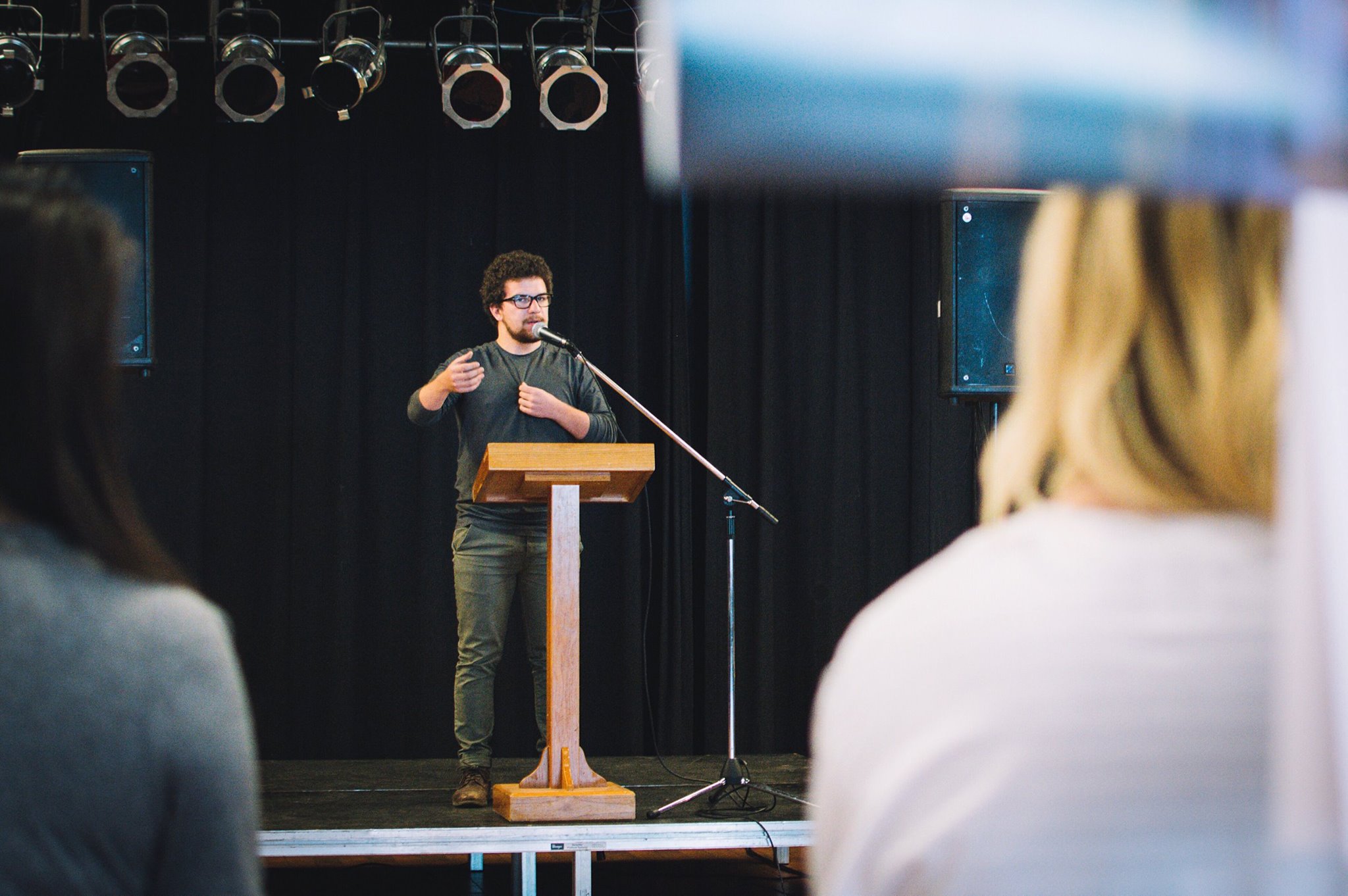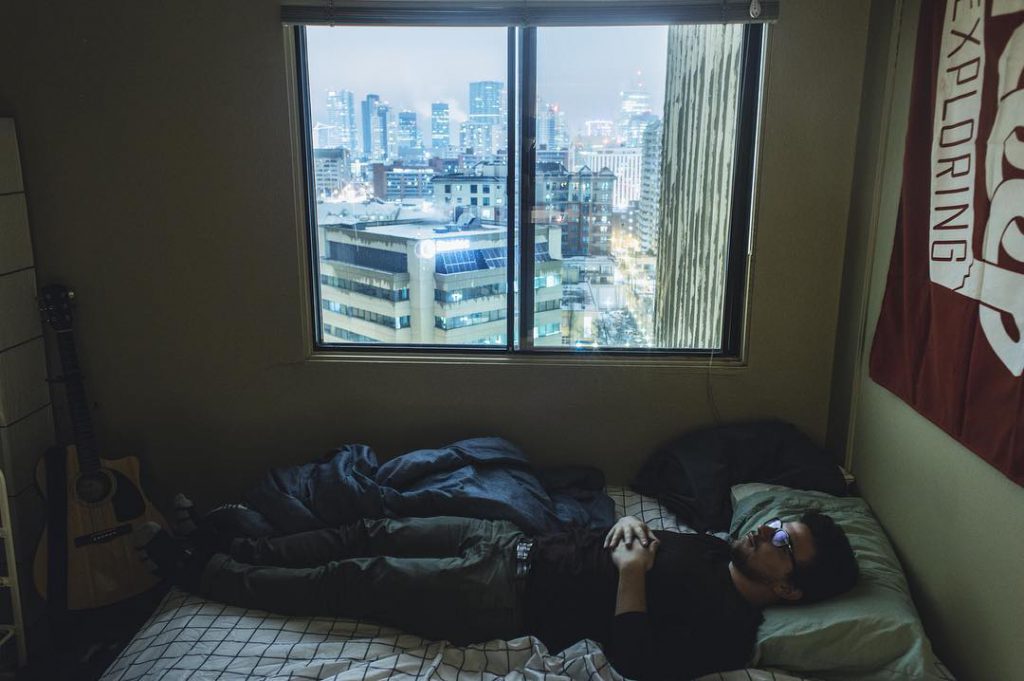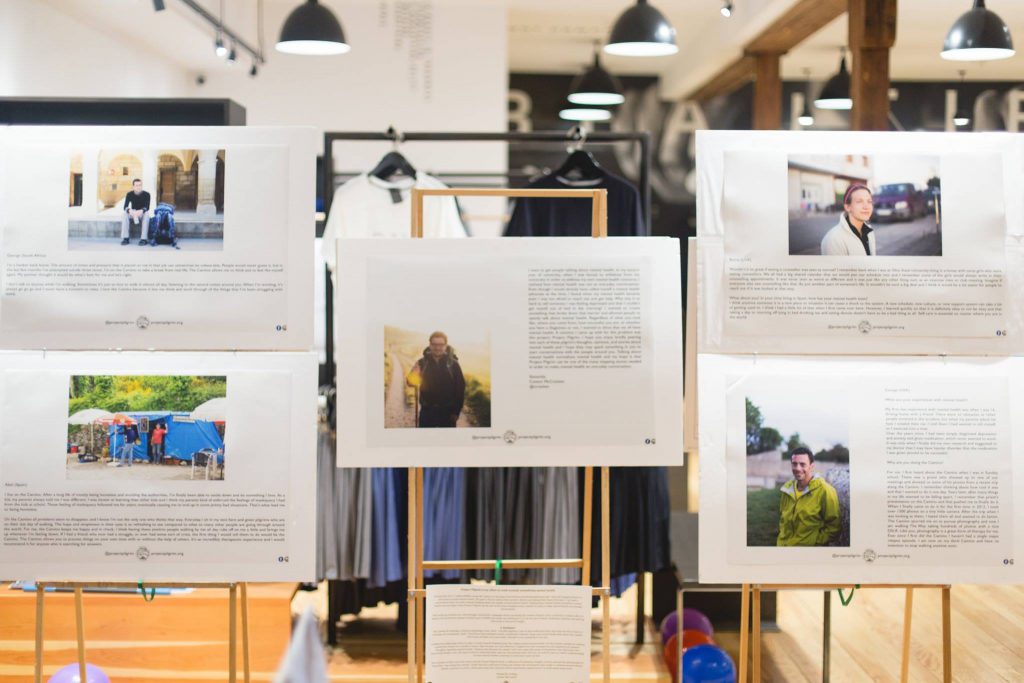Connor’s Story
OCTOBER 19, 2017: The room was packed. Nearly 100 people, including artists, doctors, social workers and academics, were at the event, and as they waited for the speeches to start, they stood around eating hors d’oeuvres and exchanging pleasantries.
A few years back, Connor would have felt uncomfortable in a crowd that size. But on this particular night, the 22-year-old was actually having fun. So much fun, in fact, that he felt a sudden urge to take a second for himself and savour the moment.
He moved away from the crowd and looked down at the program he was clutching in his right hand. He began leafing through it, stopping at one particular page.
“Connor combined his interest in photography, the outdoors and his lived experience with mental illness to create a remarkable project inspiring others to talk about mental health,” it said.
“Both in Canada and in Spain, I was continuously blown away by the fact that I could reach out to complete strangers and they would tell me their stories. It became clear that so many people needed that space, and a lot of them treated the project as a way to say here I am, this is what I’m struggling with.”
It still shocked him to see his name there, surrounded by so many people who had devoted their life to raise awareness for mental health.
“When I was told I had been chosen among the top 150 people changing the face of mental health in Canada, I couldn’t believe it,” he’d say a couple of days later. “It was incredible, especially because the award wasn’t only recognizing me, it was also acknowledging all the people who shared their story as part of my project.”
Later that night, as Connor lay awake in his bed, images from the last few years of his life flooded his memories. He couldn’t help but feel like the award he had just received was a fantastic recognition; one he could never have imagined receiving just a couple of years earlier.

JUNE 2013: Growing up, Connor had always been social. He liked playing sports and hanging out with his friends. He also did well in school, had a close relationship with his family, and didn’t really spend too much time worrying about things.
But at some point, things started to change. It was a gradual change that began around the time he was in Grade 11.
“It started in an unexpected way,” he says. “I had been in a typical teenage relationship for three years, and when that ended I noticed that I had been so devoted to it, so immersed, that I had alienated myself from all of my friends.”
After the break up, Connor tried to mend things with his friends, but things didn’t go as planned: they had moved on and wanted nothing to do with him.
“I felt rejected, and my response was to go into complete overdrive and just try really, really hard to make friends with whoever would take me,” he says.
In his desperation to fit in, Connor began approaching people who he had nothing in common with. He’d do all he could to befriend them (“I was trying so hard, I’d freak people out,” he says), but those superficial friendships never prospered, making Connor more and more disillusioned.
By the end of that school year, he was already showing early signs of depression and anxiety. His confidence was so shattered that he’d beg his parents to let him skip school. He’d spend days and days in bed, beating himself up for not being able to socialize. Over the next year things only got worse. He spent more and more time alone, stopped trying to make friends at school and even skipped his prom.
But one thing kept him going.
“I had this fantasy that I would go to a university where I didn’t know anyone, and just start over and be happy there. So I declined all the other schools I was accepted into and decided to go to the University of Alberta in Edmonton because it was the one place I got into where I didn’t know anyone else.”
“Connor combined his interest in photography, the outdoors and his lived experience with mental illness to create a remarkable project inspiring others to talk about mental health.”
NOVEMBER 2, 2015: It was almost 11 o’clock on a Saturday night in Edmonton, and Connor was wide-awake. His roommate wasn’t home, and the apartment they shared felt cold and dark.
Although he was in his third year of university, Connor still felt out of place in Edmonton. He had come to despise the long, dark winters and questioned his decision to major in Chemistry. Far from helping his mental health, the move had pushed him into a depressive slump.
A year earlier, he had taken some time off of school and moved back to Vancouver to get help. He had felt better for a while, but upon his return to Edmonton the depression had come back full force. Now, he felt trapped by the darkness.
“I remember feeling absolutely powerless,” he says. “At the moment I was done feeling bad, but I couldn’t figure out how to get myself out of the slump I was in.”
As he stared out at the city lights contemplating the possibility of ending his life, his phone suddenly rang, shattering the silence in the apartment. It was a message from a friend. “I’m coming over,” was all it said.
As he looked down at his phone, Connor shook the dark thoughts from his mind. He began tidying up his apartment. After all, his friend was on his way, and there suddenly seemed to be something to look forward to.

MAY 2016: The Camino de Santiago is a network of old walking trails that cuts across Spain like a jagged scar. For centuries, this network has guided pilgrims through breathtaking terrain on a journey of meditation and introspection.
Only six months had passed since that difficult night in Edmonton, but as Connor walked through the Spanish countryside he could feel how much had changed in his life. In the months leading to his trip, he had decided to leave Edmonton, apply to a design program on a whim, and pick up an old hobby: photography.
And more importantly, he had found himself a new passion.
“Project Pilgrim was born during Christmas of that year, and it was my way to make sense of what had happened to me. I decided that I needed to do something I loved, which was take pictures, and use it for something meaningful: Telling stories of people like me who were dealing with mental health challenges.”
As part of the project, Connor had already interviewed and photographed over 350 people in Canada and launched a Kickstarter campaign to fund his trip. Now, he was approaching the last part of his project, which consisted of interviewing pilgrims from around the world about their struggles with mental health.
“It benefited me to understand that so many other people go through these challenges and that I’m not alone in that way.”
So, as he walked along the Spanish countryside, Connor mustered his courage and approached a stranger. Within minutes they were sharing stories and Connor was snapping a portrait of them.
“Both in Canada and in Spain, I was continuously blown away by the fact that I could reach out to complete strangers and they would tell me their stories. It became clear that so many people needed that space, and a lot of them treated the project as a way to say here I am, this is what I’m struggling with.”
Project Pilgrim became an incredible success. Online, it reached over 1.4 million people and eventually became a book. But more importantly, it created a safe space for hundreds of people to tell their loved ones about their struggles.
“I never would have thought while I was sitting in Vancouver a month after a suicide attempt, that I would create a project that would have such a big impact for so many people,” Connor says. “It truly changed my life.”

OCTOBER 2017: Whenever he looks back at the last two years of his life, Connor can’t help but feel grateful. He feels like his project gave him a purpose and allowed him to see that he wasn’t alone in his struggles with mental health.
“It benefited me to understand that so many other people go through these challenges and that I’m not alone in that way,” he says. “The hundreds of stories I’ve heard over the last two years have taught me a ton about the breadth of mental health, and everything it can cover.”
A couple of days after being recognized as one of the 150 leading Canadians in mental health, there’s one thought he can’t shrug: He says that although he wouldn’t wish these challenges upon anyone, in the long run their impact on his life have actually been positive.
“If it wasn’t for my mental health issues, I would have never would have gotten into photography or design, which are my two biggest passions,” he says. “I was heading towards a career in chemistry that I liked but wasn’t too sure about, and my mental health challenges changed that path and made me stronger in the process.”
*FULL DISCLOSURE: Connor is also the photographer for this project
This story is part of a series aimed at sharing the experiences of young people across BC. As part of Foundry’s goal to work alongside young people, create connections and promote mental health and wellness, we are creating a platform for young people’s stories to be heard.
Article by Peter Mothe. Photography by Connor McCracken.
If you are in crisis, please call 1-800-784-2433.
Find out more about Foundry.